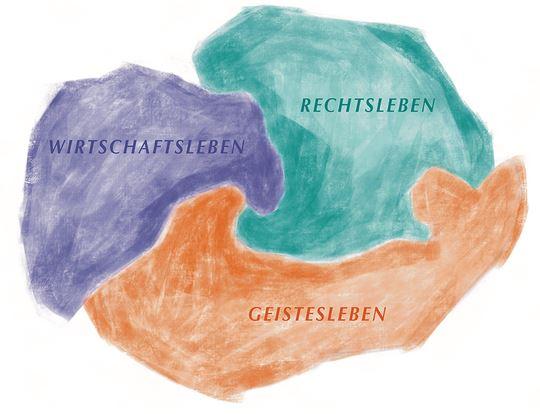Threefold Model

🌍 What is Social Threefolding?
Steiner's vision for social renewal proposes that a society should be structured into three independent, yet interconnected spheres, each of which operates according to its own laws, principles, and needs:
-
Cultural Sphere (Spiritual/Cultural Life):
-
This sphere encompasses education, art, science, religion, and all forms of cultural and intellectual life.
-
The idea is to free culture from politics and economics, allowing the creative and spiritual capacities of humanity to flourish without interference from economic or political concerns.
-
In this sphere, the guiding principle is freedom—individuals should be able to express themselves freely and pursue knowledge and creativity according to their unique potential.
-
-
Political Sphere (Rights and Law):
-
This sphere covers the realm of laws, government, justice, and human rights.
-
The aim here is to separate political governance from both economics and culture.
-
The guiding principle is equality—ensuring that everyone has the same legal rights and is treated equally under the law, regardless of social or economic status.
-
Steiner proposed a democratic and participatory system where individuals can contribute to political decisions based on equality and shared human dignity.
-
-
Economic Sphere:
-
This sphere is concerned with the production, distribution, and exchange of goods and services.
-
Steiner advocated for a system that recognizes the interdependence of people while ensuring that economic activities are not dominated by financial interests or political power.
-
The guiding principle here is brotherhood—the idea that individuals and communities work together for mutual benefit and share in the fruits of their labor in a way that benefits everyone.
-
🧭 Why the Threefold Model?
Steiner believed that modern society was overly concentrated in one area—often focusing too heavily on economics or politics, to the detriment of cultural and spiritual freedom. He argued that these three spheres had become too intertwined and needed to be separated to function healthily.
In this way, Social Threefolding provides an alternative to both capitalism (which he felt prioritizes economic power over the other spheres) and statism (which subordinates the individual and culture to the state).
✨ Practical Applications of Social Threefolding
-
Education: Steiner believed that education (especially in the form of Waldorf schools) should be free from political and economic pressures, allowing children to develop their unique capacities for creativity, learning, and social engagement.
-
Economics: He proposed that economic activities should be cooperative and localized, with individuals and communities working together based on mutual benefit rather than competition. This also includes the concept of "gift economy"—the idea that the sharing of resources, goods, and services should be based on human relationships rather than mere transactions.
-
Politics: Steiner’s political vision involves a democratic structure where people have the right to self-govern, participate in decision-making, and live with dignity. The political system should ensure that everyone is treated equally and has access to the means of freedom and justice.
🌱 The Ideal Vision of Social Threefolding
Steiner’s concept of Social Threefolding aims to create a society in which freedom, equality, and brotherhood operate in harmony.
-
Freedom is nurtured in the cultural sphere, allowing creativity and individuality to flourish.
-
Equality is established through law and governance in the political sphere, ensuring that all people are treated justly.
-
Brotherhood is expressed in the economic sphere, where people work cooperatively and share resources for the common good.
💡 Challenges and Critiques
While many of Steiner's ideas resonate with modern alternative movements and have been implemented in various forms (like Waldorf schools, biodynamic farming, and social finance), Social Threefolding has been seen by some as idealistic and difficult to implement in practice on a large scale.
-
The separation of the three spheres can be challenging, especially in contemporary society where political and economic interests often overlap and influence cultural life.
-
Critics argue that the implementation of such a model requires a radical shift in consciousness and societal structure, which may be difficult in a world dominated by capitalist economies and centralized political power.

